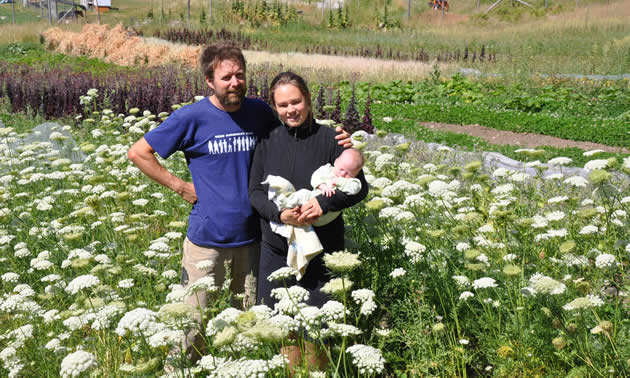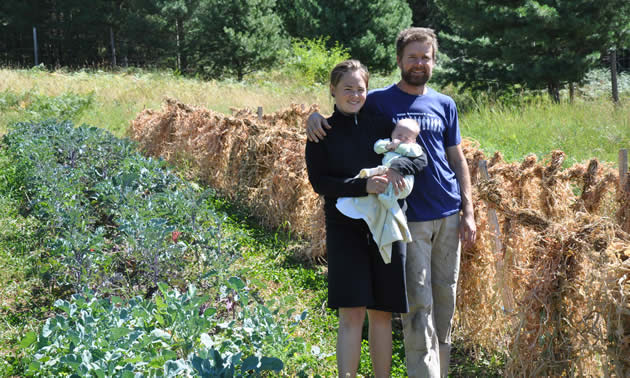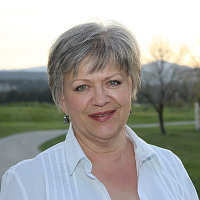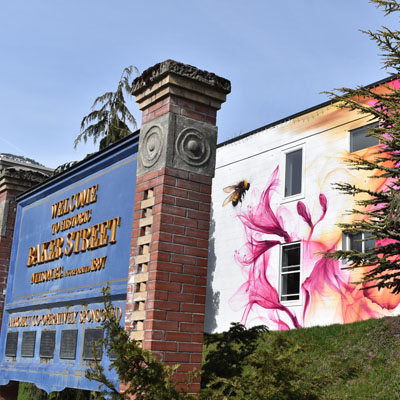Johnsons Landing revisited
Kootenay Joe Farm, which produces organic heirloom vegetables and flower seeds, is struggling to survive
On July 10, 2012, I conducted a prearranged telephone interview (see the story below) with Patrick Steiner of Kootenay Joe Farm, which is located in a tiny community that I had never heard of: Johnsons Landing, B.C. It was a good interview—Steiner is articulate, intelligent, open, sensitive, and very invested in his life work. The interview material was easy to work with, and in two days I had a satisfactory draft of my story ready to send back to him for a fact-check. Hearing the words “Johnsons Landing” on the CBC news that evening, along with the horrifying story that was developing because of a massive landslide there, was a shock.
Steiner, his wife, Colleen O’Brien, and their infant son were not hurt in the landslide, but had to leave their home. This is their story, pre 7/12/12.
From their tiny acreage in Johnsons Landing, B.C., with the help of a couple of seasonal workers, Patrick Steiner and Colleen O’Brien are quietly making an impact on food production across the province.
Kootenay Joe Farm is home to Stellar Seeds, a small business in B.C.’s West Kootenay region. Though the business is small in itself, it is part of a large, complex system. Making a living growing and selling organic, heirloom, open-pollinated vegetables, flowers and herbs on their four-acre farm might—just—be possible, but Steiner and O’Brien have a broader, deeper vision. While they certainly sell their seedlings and produce at the farmers markets in nearby Kaslo, their main business is seed production.
“The great thing about seeds,” Steiner said, “is that you don’t need much space to produce a lot of them.”
Steiner and O’Brien have been in the seed business for 12 years, producing diverse heirloom varieties of seeds that are adapted to the climate of southern British Columbia. They also partner with other farmers in the southern half of the province, and this allows them to obtain and sell a wider selection of seed varieties.
Increasing concerns
Steiner noted that there are growing concerns about our society’s food quality, and he said people are looking for access to a variety of locally grown, open-pollinated seeds. Because of this interest, Stellar Seeds experienced slow but steady growth until three years ago, when sales plateaued. The global recession may be partly to blame for this, but the company is also facing much greater competition now. Because the interest in organic and heirloom seeds has been growing, some of the larger seed-production companies have recognized the potential market and introduced their own lines.
“Although there are many organic seeds available in the market today,” said Steiner, “many are not locally grown and may not be heirlooms or even open pollinated—they are modern hybrid cultivars.”
The last 30 years have seen increased corporate ownership of seed resources internationally, to the point where now fewer than five companies own, under patent, over 85 per cent of the seeds available. Monsanto is by far the leader in that small group.
“A lot of people think that our interests as human beings, our need to eat healthy foods, is not necessarily represented by these companies,” Steiner said.
According to Steiner, not only is there more biodiversity available in the greater variety of seeds sold by the small-scale heirloom seed producers, there is no likelihood of genetic modification with its attendant unknown effects. Farmers like Steiner and O’Brien, who employ benign and beneficial growing methods, are leaders in the trend toward more wholesome food production.
Aftermath
On August 14, about one month after the landslide at Johnsons Landing, I received this email from Patrick Steiner:
“We've been back at the farm for about two weeks now, after being evacuated for two weeks. We're still working hard to re-normalize after the slide. Our own property wasn't directly hit so we are lucky that way. However, it is a shock to see how such a massive natural disaster has changed our community. And our farm has been indirectly impacted quite severely due to not being able to irrigate for almost a month as the community water system was destroyed and took time to rebuild. We definitely lost crops and will have a reduced income/yield this year.”








Comments